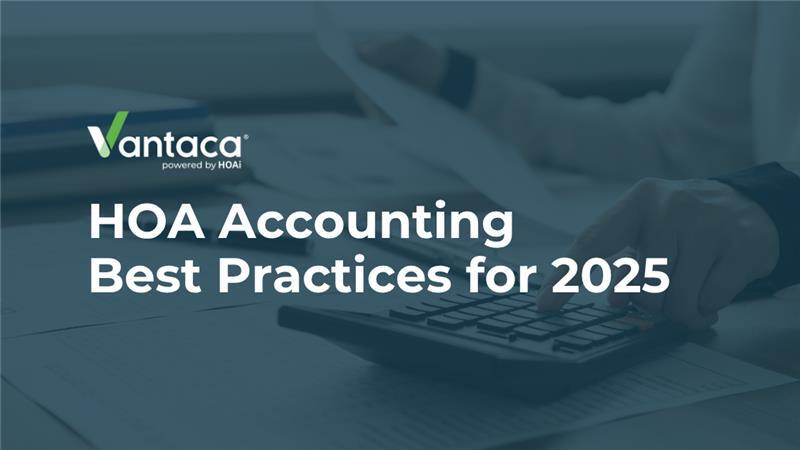

How Leading Management Companies Reduce Risk, Improve Accuracy, and Scale Smarter
In 2025, HOA management companies face growing pressure to deliver financial accuracy, faster turnaround times, and airtight compliance. Manual processes and legacy systems are no longer good enough — especially with evolving board expectations, new regulatory requirements, and increased homeowner scrutiny.
This isn’t just about bookkeeping. It's about building a financial operation that protects your business, scales efficiently, and strengthens client confidence.
Why Strong HOA Accounting Matters More in 2025
- 73% of homeowners now expect real-time access to association financial data.
- New state-level regulations are increasing pressure on boards to deliver detailed reporting, maintain reserves, and ensure compliance.
- Poor accounting practices can lead to board liability, fines, and special assessments averaging $2,000–$5,000 per household.
Effective financial management helps protect your community and positions it for long-term success.
The Hidden Cost of Outdated Accounting
Outdated financial practices are more than inconvenient — they put your firm at risk.
- Errors and missed deadlines can damage board trust and lead to client churn
- Limited visibility makes it harder to answer board or homeowner questions quickly
- Weak internal controls increase vulnerability to fraud and audit findings
- Manual processes slow down month-end closes and budget season timelines
With most boards expecting real-time financial data and transparency, the pressure is on.
Four Essentials for Financial Excellence
Follow GAAP and Accrual-Based Accounting
Accrual accounting provides a complete picture of income and expenses, aligning with Generally Accepted Accounting Principles (GAAP). This builds accuracy, improves reporting, and enables better forecasting — critical for growing portfolios.
Pro tip: Train teams to understand accruals vs. cash-based reporting. Boards often need help interpreting this.
Implement Scalable Internal Controls
Strong internal processes protect both your business and your clients. Build a framework that includes:
- Segregation of duties to prevent fraud
- Automated approval processes with documentation trails
- Monthly reconciliations with banking integrations
- Cloud-based recordkeeping for access and audit-readiness
Standardize Financial Reporting Across Associations
Boards want clarity. Standardizing your financial packages helps them — and your team — make faster, better decisions. At minimum, include:
- Balance Sheet
- Income & Expense Statement
- General Ledger
- Accounts Payable and Receivable Reports
- Cash Disbursements Ledger
Add value: Include variance summaries and high-level commentary your team can replicate across associations.
Invest in Automation and AI
Manual accounting costs you time, headcount, and accuracy. Tools like HOAi allow your team to:
- Generate annual budgets in minutes
- Automate invoice processing
- Answer homeowner billing questions instantly
- Speed up month-end close from weeks to days
This frees your staff for higher-value work and improves client satisfaction without adding overhead.
Navigating Financial Compliance in 2025
HOA financial oversight continues to evolve. Management companies must stay informed and prepared to support boards through:
- Reserve study mandates with specific timelines and funding requirements
- Enhanced board training and disclosure regulations in many states
- Stricter financial reporting requirements for budget approvals and assessments
- Cybersecurity expectations for protecting financial and personal data
Staying compliant not only protects your clients — it positions your company as a knowledgeable, trusted partner.
Why This Matters for Your Bottom Line
Poor accounting practices don’t just impact clients — they cost your business.
- $50,000+ annual losses from penalties, special assessments, and client turnover
- Increased board churn due to confusion and dissatisfaction
- Legal liability when reporting, reserves, or internal controls fall short
On the flip side, companies that modernize financial management:
- Close faster
- Scale without growing headcount
- Improve retention through trust and transparency
Final Takeaway
HOA accounting isn’t just about compliance — it’s a growth enabler. With the right practices and technology in place, management companies can deliver board-level confidence, reduce financial risk, and build operations that scale.
In 2025, financial excellence isn’t a differentiator — it’s the standard.
Tag(s):
Accounting
Other posts you might be interested in
View All Posts.svg)
News
06.11.24
ReadyRESALE by AssociationREADY and Vantaca Join Forces to Revolutionize Resale Document Automation
Read More
Automation
02.4.25
Ditch the Spreadsheets: Automate Your Way to Scalability and Success
Read More
Business
10.15.24
HOA Software Trends: How Technology is Enhancing Community Management
Read MoreSubscribe to Vantaca Updates
Stay up-to-date with the latest Vantaca Insights
